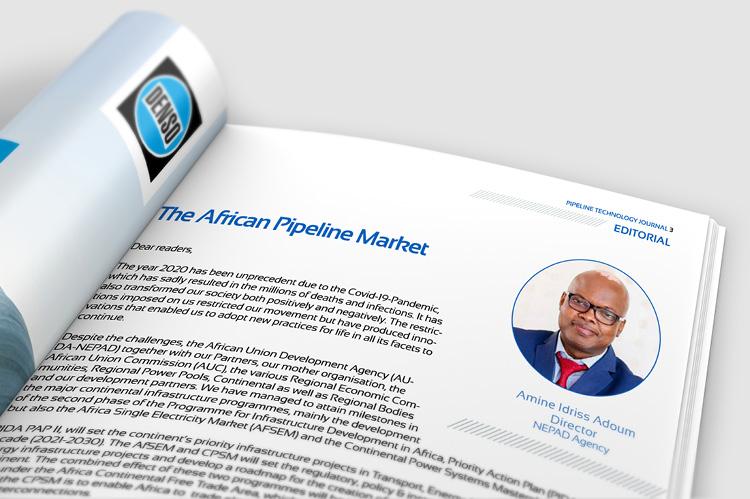Editorial: The African Pipeline Market

Dear readers,
The year 2020 has been unprecedent due to the Covid-19-Pandemic, which has sadly resulted in the millions of deaths and infections. It has also transformed our society both positively and negatively. The restrictions imposed on us restricted our movement but have produced innovations that enabled us to adopt new practices for life in all its facets to continue.
Despite the challenges, the African Union Development Agency (AUDA-NEPAD) together with our Partners, our mother organisation, the African Union Commission (AUC), the various Regional Economic Communities, Regional Power Pools, Continental as well as Regional Bodies and our development partners. We have managed to attain milestones in the major continental infrastructure programmes, mainly the development of the second phase of the Programme for Infrastructure Development in Africa, Priority Action Plan (PIDA PAP II), but also the Africa Single Electricity Market (AFSEM) and the Continental Power Systems Masterplan (CPSM).
PIDA PAP II, will set the continent’s priority infrastructure projects in Transport, Energy, ICT and Water for the next decade (2021-2030). The AfSEM and CPSM will set the regulatory, policy & instructional framework, identify priority energy infrastructure projects and develop a roadmap for the creation of a single energy market on the African Continent. The combined effect of these two programmes will be to stimulate industrialisation and intra-Africa trade under the Africa Continental Free Trade Area, which will come into effect in 2021. In addition, the long-term goal of the CPSM is to enable Africa to trade electricity with Europe, the Middle East and Asia through existing and future interconnections.
I have singled out these initiatives because they have one thing in common with the Pipeline Journal, which is the promotion of oil and gas pipelines as well as emerging trends such as green hydrogen. Traditionally, PIDA PAP has included priority oil and gas pipelines in East Africa and pipelines linking West Africa to North Africa. AfSEM will develop a continental oil and gas pipeline masterplan and the CPSM will address the prospects and opportunities for green hydrogen for electricity storage. These programmes will draw lessons from on leak detection and third-party intrusion as well as illegal tapings from the existing pipeline infrastructure particularly in Nigeria and pipeline protection from sabotage, for e.g. in Mozambique.
As we start the third decade of the 21st century, Africa is positioning itself to exploit these emerging trends. Africa will develop the infrastructure (including pipeline) for the production, distribution and upstream beneficiation and use of oil, gas and hydrogen to accelerate Africa’s electrification and energy independence.
Yours,
Amine Idriss Adoum,
Director, Programme Delivery and Coordination,
NEPAD Agency
